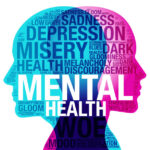 June is officially recognized as Men’s Mental Health Awareness Month, a month dedicated to shedding light on the mental health challenges faced by men and encouraging open dialogue about emotional well-being. For too long, societal expectations have placed a burden on men to appear strong, stoic, and self-reliant, leading many to suppress their emotions and struggles. This month is a call to action to break that silence, eliminate stigma, and foster an environment where men feel comfortable prioritizing their mental health.
June is officially recognized as Men’s Mental Health Awareness Month, a month dedicated to shedding light on the mental health challenges faced by men and encouraging open dialogue about emotional well-being. For too long, societal expectations have placed a burden on men to appear strong, stoic, and self-reliant, leading many to suppress their emotions and struggles. This month is a call to action to break that silence, eliminate stigma, and foster an environment where men feel comfortable prioritizing their mental health.
Why Men’s Mental Health Matters
Mental health is just as important for men as it is for anyone else. However, studies show that men are less likely to seek help when they face mental health challenges. According to the National Institute of Mental Health (NIMH), men are often less open about feelings like sadness or stress, which can result in untreated mental health conditions such as depression, anxiety, and stress-related disorders. This is especially concerning considering that men are at a higher risk of suicide, with suicide rates being significantly higher in men than women.
Men’s Mental Health Awareness Month aims to change the conversation and encourage men to seek support when needed, without fear of judgment. It’s essential to foster understanding that mental health struggles do not make anyone weak; in fact, seeking help takes strength.
The Role of Society in Men’s Mental Health
Traditionally, society has upheld certain norms about masculinity that discourage emotional vulnerability in men. Phrases like “man up” or “don’t cry” perpetuate the idea that men must be tough at all costs, even if it means ignoring their emotional needs. These social norms often prevent men from speaking out about their mental health struggles, leading to feelings of isolation, shame, and, in some cases, untreated conditions that worsen over time.

Breaking these societal norms is at the heart of Men’s Mental Health Awareness Month. This month is a time to acknowledge the pressures men face and create a supportive environment where they can talk about mental health without fear of judgment.
Common Mental Health Issues Among Men
Several mental health issues disproportionately affect men, including:
-
Depression: Men may not exhibit the same signs of depression as women. Instead of feeling sad or withdrawn, men might experience irritability, anger, or physical symptoms like headaches or digestive problems. Recognizing these signs is crucial in getting men the help they need.
-
Anxiety: Anxiety disorders are common in men, but they often go unnoticed because men may not want to admit they are struggling. Work stress, financial issues, and relationship problems can all contribute to heightened anxiety.
-
Suicide: As mentioned earlier, men are at a higher risk of suicide than women. This stark reality emphasizes the need to have open conversations about mental health and encourage men to seek help early.
-
Substance Abuse: To cope with mental health struggles, some men may turn to alcohol or drugs, which can further exacerbate the problem. Recognizing the link between mental health issues and substance abuse is key to providing the right interventions.
-
Post-Traumatic Stress Disorder (PTSD): Men, particularly those who serve in the military or work in high-risk jobs, are at a higher risk for PTSD. The trauma from combat, accidents, or violent incidents can leave lasting effects on mental health.
How to Support Men’s Mental Health
While raising awareness is vital, taking tangible steps to support men’s mental health is equally important. Here are a few ways you can make a difference:
-
Encourage Open Conversations: Start conversations about mental health with the men in your life. Let them know that it’s okay to talk about their emotions and struggles, and that seeking help is a sign of strength, not weakness.
-
Provide Resources: Ensure that men have access to mental health resources such as counseling, therapy, and crisis helplines. Share information about these resources to make seeking help easier.
-
Challenge Gender Norms: Help challenge outdated norms that discourage men from expressing vulnerability. Encourage the men around you to embrace their emotions and show them that emotional well-being is important for everyone.
-
Promote Healthy Habits: Encourage men to engage in activities that promote mental wellness, such as regular physical exercise, healthy eating, practicing mindfulness, and spending quality time with loved ones.
-
Listen and Offer Support: Sometimes, all a person needs is someone to listen. Be supportive and non-judgmental if a man opens up about his mental health struggles. Your support can make all the difference.
Men’s Mental Health: Breaking the Silence Starts Now
This Men’s Mental Health Awareness Month, let’s raise our voices to break the silence surrounding men’s mental health. By increasing awareness, fostering conversations, and providing resources, we can create a world where men feel empowered to take control of their mental well-being. It’s time to challenge harmful stereotypes, normalize vulnerability, and encourage men to prioritize their mental health, not just in June, but every day of the year.
Let’s all do our part to ensure that Men’s Mental Health Awareness Month is more than just a reminder—it’s the beginning of a lasting change in how we view and support men’s mental health.

